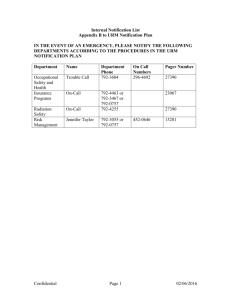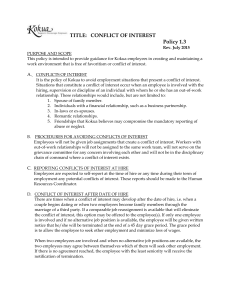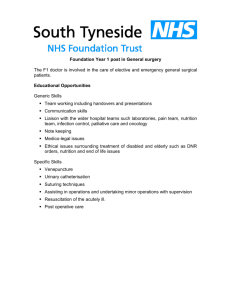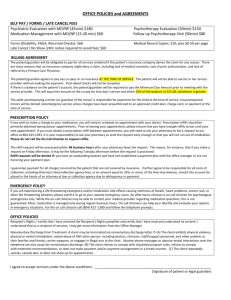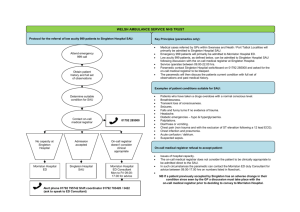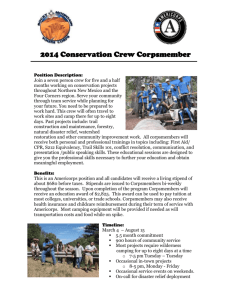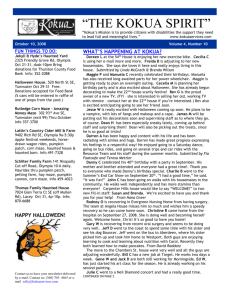Policy 2.2: Emergency Procedures
advertisement
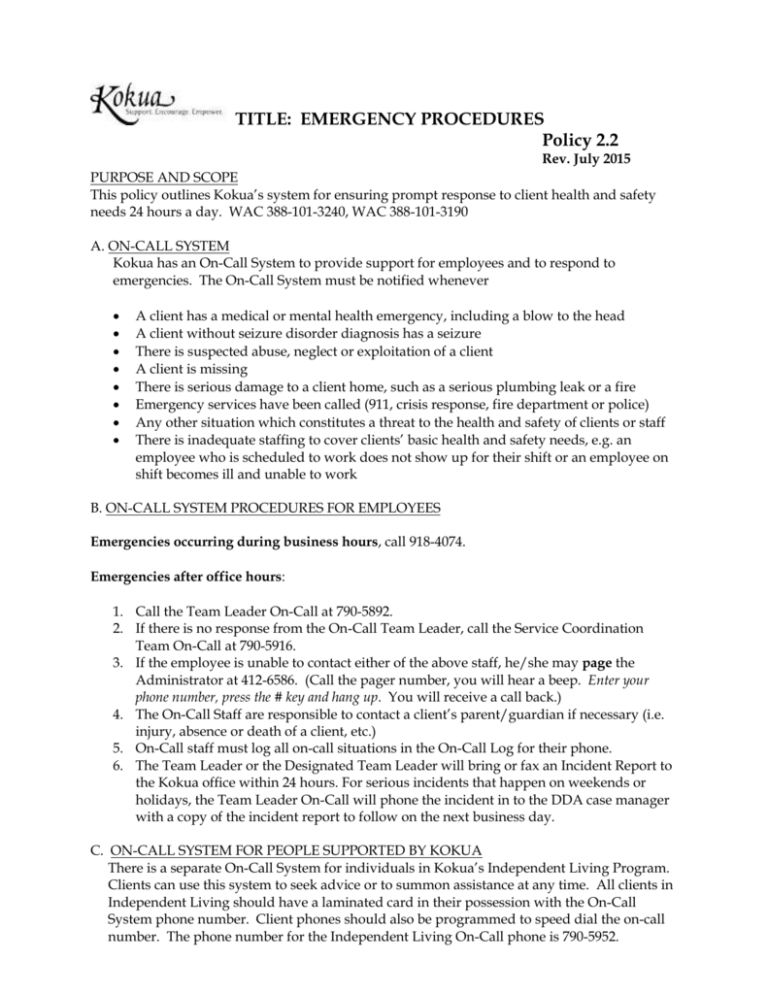
TITLE: EMERGENCY PROCEDURES Policy 2.2 Rev. July 2015 PURPOSE AND SCOPE This policy outlines Kokua’s system for ensuring prompt response to client health and safety needs 24 hours a day. WAC 388-101-3240, WAC 388-101-3190 A. ON-CALL SYSTEM Kokua has an On-Call System to provide support for employees and to respond to emergencies. The On-Call System must be notified whenever A client has a medical or mental health emergency, including a blow to the head A client without seizure disorder diagnosis has a seizure There is suspected abuse, neglect or exploitation of a client A client is missing There is serious damage to a client home, such as a serious plumbing leak or a fire Emergency services have been called (911, crisis response, fire department or police) Any other situation which constitutes a threat to the health and safety of clients or staff There is inadequate staffing to cover clients’ basic health and safety needs, e.g. an employee who is scheduled to work does not show up for their shift or an employee on shift becomes ill and unable to work B. ON-CALL SYSTEM PROCEDURES FOR EMPLOYEES Emergencies occurring during business hours, call 918-4074. Emergencies after office hours: 1. Call the Team Leader On-Call at 790-5892. 2. If there is no response from the On-Call Team Leader, call the Service Coordination Team On-Call at 790-5916. 3. If the employee is unable to contact either of the above staff, he/she may page the Administrator at 412-6586. (Call the pager number, you will hear a beep. Enter your phone number, press the # key and hang up. You will receive a call back.) 4. The On-Call Staff are responsible to contact a client’s parent/guardian if necessary (i.e. injury, absence or death of a client, etc.) 5. On-Call staff must log all on-call situations in the On-Call Log for their phone. 6. The Team Leader or the Designated Team Leader will bring or fax an Incident Report to the Kokua office within 24 hours. For serious incidents that happen on weekends or holidays, the Team Leader On-Call will phone the incident in to the DDA case manager with a copy of the incident report to follow on the next business day. C. ON-CALL SYSTEM FOR PEOPLE SUPPORTED BY KOKUA There is a separate On-Call System for individuals in Kokua’s Independent Living Program. Clients can use this system to seek advice or to summon assistance at any time. All clients in Independent Living should have a laminated card in their possession with the On-Call System phone number. Client phones should also be programmed to speed dial the on-call number. The phone number for the Independent Living On-Call phone is 790-5952. D. REIMBURSEMENT FOR ON-CALL Employees who have on-call responsibilities will be reimbursed at a daily rate for each day they are on-call. When an on-call staff person receives a call or a page, that employee should claim work hours for the time spent in response. On-call responders should claim a minimum time of 1 hour (for additional calls, additional hours may be claimed if the additional calls are outside of the first one-hour window.) E. INCIDENT REPORT FOR EMERGENCIES An Incident Report Form must be filled out by on-duty staff for all emergencies, regardless of severity, before leaving the shift in which the incident occurred. F. MEDICAL EMERGENCY If minor first aid is required, use the First Aid Kit. Fill out an incident report and note in client’s log before the end of the shift in which the incident occurred. If a client needs more help than you are able to render, call 911. Do not transport clients in personal vehicles for emergencies unless instructed to do so by emergency personnel. Employees should initiate CPR if a client is found without a heartbeat. CPR should be continued until emergency medical personnel arrive to assume responsibility for the client. Kokua staff must initiate CPR even if a client has a POLST form signed by the client’s doctor that has instructions for withholding CPR. Only a doctor, a nurse, emergency medical personnel or another medical professional can make the decision to stop CPR. The only exception to this procedure would be if Kokua has an Exception to Policy approved by the DDD Division Director that allows Kokua staff to honor the POLST directive to withhold CPR. Exceptions are typically granted only in cases where the client has been diagnosed as terminally ill and is receiving hospice services in their home. G. CLIENT INVOLVEMENT WITH LAW ENFORCEMENT If a client is involved in any type of alleged illegal activity, either as a suspect or as a witness, staff will notify the Kokua office or Kokua on-call system. Staff will cooperate with law enforcement personnel to the best of their ability H. MISSING PERSON In the event a client receiving 24-hour services from Kokua is missing from their residence or other location, the On-Call System will be contacted immediately. (See Section B above.) The “On-Call” employee will investigate to clarify where a client is supposed to be, including appointments, friends, work, etc. The on-call staff person will notify law enforcement if it is clear that a client with 24-hour services is not at any of the standard locations. I. FIRE EMERGENCY 1. For a minor fire emergency, use the fire extinguisher. 2. In case of a major fire, remove the clients from the house immediately. 3. When the clients are safely away from the house, call 911. 4. The clients’ safety is your only concern. Do not attempt to save property or re-enter the home. 5. If clients cannot be removed from the home, shut their door and place a towel at the bottom of the door. 6. Wait outside the home for the emergency vehicles to arrive and point out the location of the client. 7. Call the Kokua On-Call System to report the fire. J. FIRE DRILL A fire drill must be completed in each client’s home at least once per month. The process is as follows: 1. Sound the smoke alarm 2. Call out “fire” to the clients. 3. Cue or assist clients in leaving via nearest exit. 4. Periodically practice exiting by crawling or other appropriate means. 5. If clients are distressed by drills they should be forewarned of the drill. Clients will receive fire safety training during each drill. This may include reviewing all exits, feeling doors for heat before opening, purpose of crawling, proper use of extinguishers, etc. All completed fire drills must be logged on the monthly Safety Equipment Checklist. K. OTHER EMERGENCY If there is imminent danger to client, staff or others, call 911 first (Fire, Assault, Run Away, Suicidal Behavior, etc.). The Kokua On-Call System must be notified whenever there is a 911 call. L. TEAM EMERGENCY PLANS Each team is responsible to maintain an up-to-date written Emergency Plan. All new staff should read the Emergency Plan as part of their house orientation. The Emergency Plan should be followed in the event of a natural disaster such as a snowstorm, summer heat emergency, power outage, earthquake, flood, volcanic eruption or civil emergency. All Emergency Plans must include an emergency staffing plan for assuring coverage during major disasters. Teams should be prepared to continue regular client care without assistance for up to 72 hours. Client’s homes should have a 72 hour supply of emergency food and water in the event of a large scale disruption of services. M. AGENCY EMERGENCY PLAN The Administrator will maintain an agency-wide Emergency Plan which will outline the processes to be followed in response to natural or man-made disasters or civil emergencies that would impact normal agency functions. Copies of the agency-wide Emergency Plan will be kept in the homes of the Administrator and his or her designee. The Administrator will update the Agency Emergency Plan on a yearly basis.
